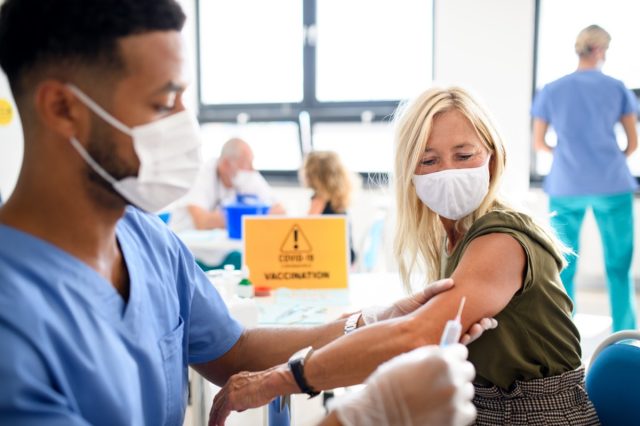If you're one of the lucky ones who've managed to escape COVID, chances are you still know the common signs to look out for: headache, shortness of breath, fatigue, fever, body aches, cough, chills, muscle aches and sore throat. However, the virus can cause a wide range of symptoms you might not expect. Dr. Javeed Siddiqui MD/MPH and Co-Founder and Chief Medical Officer at TeleMed2U says, "This is a respiratory virus that can infect a myriad of cells throughout the human body. This virus has the potential to cause an array of symptoms and therefore is to be expected that some individuals will experience 'uncommon symptoms.'" This is a very unusual virus." Eat This, Not That! Health spoke with doctors who revealed what these strange symptoms are and why they happen to some people and not others. Read on—and to ensure your health and the health of others, don't miss these Sure Signs You've Already Had COVID.

Dr. Nicole Bundy a Medical Director at Mymee and board-certified, Yale-trained rheumatologist, says a "Change in voice (typically hoarseness) has been reported and is thought secondary to the SARS-CoV-2 virus affecting the nerves that supply the vocal cords."

According to Dr. Bundy, "This can lead to heart palpitations (commonly experienced as significant rise in heart rate following minimal exertion), orthostatic intolerance (dizziness or faintness when rising from a seated position), and unexplained fever, among others. It is thought that these symptoms are caused by the body's immune system, which has been activated by SARS-CoV-2, disrupting the autonomic nervous system. Autoantibodies (antibodies that attack the body's own tissues) have been linked by some research to autonomic dysfunction associated with non-COVID infectious and non-infectious conditions."
RELATED: Dr. Fauci Says Here's When Normal Might Return

Some patients with COVID have reported issues with their digestive tract says, Dr. Siddiqui. "Due to the fact that SARS-CoV-2 uses the ACE-2 receptor, the virus can cause additional symptoms such as gastrointestinal symptoms: abdominal pain, nausea, vomiting or diarrhea."
RELATED: How to Reverse Arthritis, Say Experts

Dr. Siddiqui explains that, "Skin changes can occur in individuals with mild to moderate infection commonly manifesting flat, red rash covered with small bumps, discoloration of the fingers and toes and diffuse or localized hives. Children and young adults tend to have an increased incidence of discolorations of the toes."
RELATED: Ways to Lose One Inch of Visceral Fat

"Unlike most respiratory viruses, CoVID-19 has been associated with prolonged confusion," Dr. Siddiqui states. "Many have hypothesized this is due to hypoxemia, but even patients with mild to moderate illness have reported long term confusion. Given that COVID-19 is a coronavirus, these viruses can be associated with conjunctivitis. Although not uncommon with coronaviruses, the onset of conjunctivitis with COVID-19 has caused the general population to consider this an unusual symptom and can be associated with prolonged light sensitivity."
RELATED: Never Go Here During Omicron Surge, Experts Warn

Dr. Hadassah Kupfer, Audiologist and Hearing Aid Specialist says, "Our immune systems are so individual and complex, and when mixed with our own unique underlying conditions, COVID seems to 'stir the pot' and bring out these 'new' and unusual symptoms in individuals throughout the population. Sudden-onset tinnitus can be stressful, especially when one is in a heightened emotional state from having COVID. If the tinnitus is accompanied by a loss of hearing, one should see an ENT (Ear Nose & Throat) specialist immediately, as steroidal treatment may be able to reverse the condition if administered within a small window of time. If the tinnitus is more mild and no hearing loss is perceived, one can monitor their symptoms to see how they progress. Sometimes tinnitus will subside over the next few days/weeks as the patient recovers from COVID. Some people will see improvement up to 6 months later. If the tinnitus becomes distressing at any point, an audiologist should be consulted to get a baseline audiogram and detect any clinical changes to the ear. Specific recommendations for relief from tinnitus will also be made at that point. Unfortunately, tinnitus lasting greater than 6 months is unlikely to go away completely, and an audiologist should definitely be consulted for longer-term recommendations. Again, in these instances the individual usually had a minor hearing loss/underlying predisposition for tinnitus all along which was up-surged by the virus. So, while the side effect is still 'uncommon,' its sufferers are not as random as it would appear and they often have underlying risks in common."
RELATED: COVID Symptoms That Patients Say are "The Worst"

Dr. Siddiqui says, "The short answer is, we do not know. There are several hypothesizes include underlying conditions, diabetes, obesity, hypertension, and underlying history of respiratory issues. While another hypothesis involves, the virus causing chronic inflammation or resulting in the development of an auto-immune reaction or disease."
Dr. Millenia Lytle, ND, MPH – Head of Coaching, Mymee and a naturopathic doctor and nutrition specialist explains, "The reason you don't may not hear or read about symptoms like COVID toes, pink eye and ringing in the ears or tinnitus as often is because they tend to be more individualized: not all patients have it – plus they may not be the diagnostic symptom of the condition and yet may be debilitating. The overall symptom picture of COVID is extremely scary. Frequent symptoms of other types of infection such as thrush can occur because of certain COVID treatments that were widely administered, and also might be partially due to an imbalanced microbiome that perpetuates oral yeast growth."
Dr. Bundy states, "It remains unclear why the manifestations of COVID vary so widely from individual to individual. For those symptoms thought related to the body's immune system function following infection (as with autonomic dysfunction), an individual's inherent propensity for autoimmune reactions are likely largely at play. This propensity is determined by genetic as well as diet and lifestyle factors."
RELATED: Lose Your Visceral Fat Fastest This Way, Say Experts

Follow the public health fundamentals and help end this pandemic, no matter where you live—get vaccinated or boosted ASAP; if you live in an area with low vaccination rates, wear an N95 face mask, don't travel, social distance, avoid large crowds, don't go indoors with people you're not sheltering with (especially in bars), practice good hand hygiene, and to protect your life and the lives of others, don't visit any of these 35 Places You're Most Likely to Catch COVID.
Health - Latest - Google News
January 28, 2022 at 07:15PM
https://ift.tt/3uawOMu
Odd COVID Symptoms Doctors are Seeing Now — Eat This Not That - Eat This, Not That
Health - Latest - Google News
https://ift.tt/2zrj9Ud

No comments:
Post a Comment